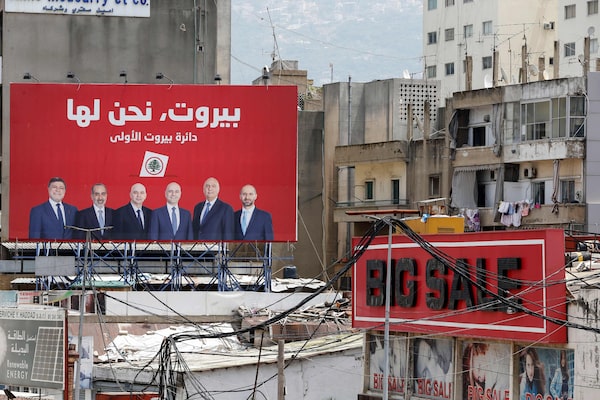
An electoral billboard is erected atop a building in Lebanon's capital Beirut, on May 14, 2022, on the eve of parliamentary elections.LOUAI BESHARA/AFP/Getty Images
Lebanese vote on Sunday in the first election since their country’s economic collapse, a test of whether Iran-backed Hezbollah and its allies can preserve their parliamentary majority amid soaring poverty and anger at ruling parties.
Following months of uncertainty over whether the election would go ahead, polls will open at 7:00 a.m. (0400 GMT) across 15 electoral districts. Nationals over the age of 21 vote in their ancestral towns and villages, sometimes far from home.
The country has been rocked by an economic meltdown that the World Bank has blamed on the ruling class, and the devastating Beirut port blast of 2020. Analysts say public outrage over both issues could propel some reform-minded candidates into parliament.
But expectations for a big shake-up are slim in Lebanon’s sectarian system, which divides parliament’s seats among 11 religious groups and is skewed in favour of established parties.
The last vote in 2018 saw heavily armed Shi’ite movement Hezbollah and its allies - including President Michel Aoun’s Free Patriotic Movement (FPM), a Christian party - win 71 out of parliament’s 128 seats.
Those results pulled Lebanon deeper into the orbit of Shi’ite Muslim-led Iran, marking a blow to the influence of Sunni Muslim-led Saudi Arabia.
Hezbollah has said it expects few changes from the make-up of the current parliament, though its opponents - including the Saudi-aligned Lebanese Forces, another Christian group - say they are hoping to scoop up seats from the FPM.
Adding a note of uncertainty, a boycott by Sunni leader Saad al-Hariri has left a vacuum, which both Hezbollah allies and opponents are seeking to fill.
As the vote neared, watchdogs warned that candidates would purchase votes through food packages and fuel vouchers issued to families hit hard by the financial collapse.
The next parliament is due to vote on key reforms required by the International Monetary Fund to unlock financial support to ease the crisis and will elect a new president to replace Aoun, whose term ends on Oct. 31.
Whatever the outcome on Sunday, analysts say Lebanon could face a period of paralysis that would put an economic recovery on hold as factions barter over portfolios in a new power-sharing cabinet - a process that can take months.